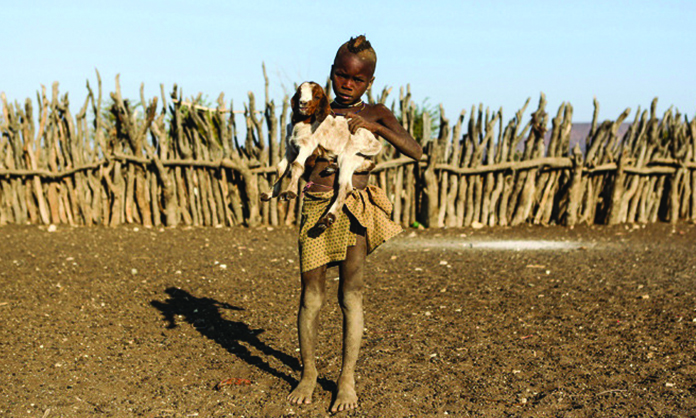… as Namibia declares state of emergency over drought
The government’s poor planning in dealing with drought and other natural disasters has been exposed, analysts say.
This comes after president Nangolo Mbumba yesterday declared a state of emergency over drought as published in the Government Gazette.
At the same time political parties are urging the government to take proactive measures against drought, natural disasters and hunger. The country has joined Malawi, Zambia and Zimbabwe, which have each declared a state of emergency after the El Niño drought left a trail of scorched harvests and hunger across southern Africa.
Political analyst Rui Tyitende says this is not the first time a state of emergency has been declared over drought, and will not be the last.

“For decades, the government’s failure to plan has meant it has planned to fail. Namibia is known to be a dry country with erratic weather patterns, and long-term solutions for climate adaptation need to be sought as a policy priority to deal with recurring droughts,” he says.
Tyitende says lives are being ravaged and food insecurity will become a permanent concern for many.
Political analyst Henning Melber says the state of emergency proclamation is a painful reminder that Namibia, due to its fragile ecology and scarce water resources, is one of the high-risk countries to suffer the impact of climate change through even less rainfall.
“Declaring a state of emergency given the devastating effects of drought was expected and comes as no surprise. A caring government needs to prepare for more such crises related to the effects of human-made natural disasters,” he says.
ELECTION YEAR
Melber says in an election year, it is crucial to examine the opposition’s policy on drought and related issues.
He says policies should address crisis management and climate-related socio-economic sustainability, with plans for resource-heavy industries, like mining and green hydrogen, including groundwater preservation.
He says policy provisions should ensure sufficient water supply for urban and rural areas and agriculture.
Namibia last declared a drought emergency in 2019.
“I declare that, with effect from 22 May 2024, a state of emergency exists in Namibia on account of the persisting national disaster of drought that exists in all the regions of the Republic of Namibia,” Mbumba yesterday declared in the Government Gazette.
EVERY 5TH NAMIBIAN SUFFERS HUNGER
Namibia is increasingly faced with a severe food crisis, with every fifth Namibian being classified as food insecure.
I-Ben Nashandi, the executive director in the Office of the Prime Minister, says the declaration primarily signals the severity of the drought and the negative impact it has on the population.
The Office of the Prime Minister last week told The Namibian that 330 000 households have registered for the government-funded drought-relief programme.
“It means that drought conditions are prevalent in all regions, and that the resources required are more than what are available. Although the government has made N$825 million available, the actual required amount is more,” Nashandi says.
He says the declaration calls for the mobilisation of assistance.
“In light of this declaration, Namibia, as part of the Southern African Development Community, joined the regional bloc to launch the drought appeal to the international community,” he says. Nashandi last week said the N$825 million would only cater for 172 200 households.
According to a Cabinet decision in April, N$600 million has been budgeted for food assistance, while N$25 million has been budgeted for seed and horticulture provision.
The livestock support programme received a budget of N$100 million, while the water provision programme also received N$100 million.
DAMS RUNNING LOW
According to the Ministry of Agriculture, Water and Land Reform, the country’s central dams are running low.
Popular Democratic Movement parliamentarian Maximilliant Katjimune says it is high time that drought is declared an emergency, citing insufficient rainfall.
“The country has experienced insufficient rainfall for a number of years now, and farmers have been left destitute as a result,” he says.
Katjimune, however, says a declaration alone is not enough.
“The declaration of a disaster by the president should not only be on pen and paper. It should translate into much more practical resources being allocated to those hardest hit by the drought, especially to our farmers and those in the rural areas,” he says.
The Landless People’s Movement’s youth command leader, Duminga Ndala, says declaring a state of emergency on drought in Namibia is a necessary step, given the severe and ongoing impact on rural communities.
“This can help the government mobilise additional resources and international assistance from the international community, thus facilitating more immediate relief efforts.
“However, it’s high time that the government provide long-term, sustainable strategies to address water scarcity and improve resilience against future drought,” she says.
Ndala says one approach is to establish a drought-relief fund within the national budget that would aim to provide immediate assistance to those affected by drought, support sustainable water management practices, and enhance the resilience of communities against future droughts.
Stay informed with The Namibian – your source for credible journalism. Get in-depth reporting and opinions for
only N$85 a month. Invest in journalism, invest in democracy –
Subscribe Now!






